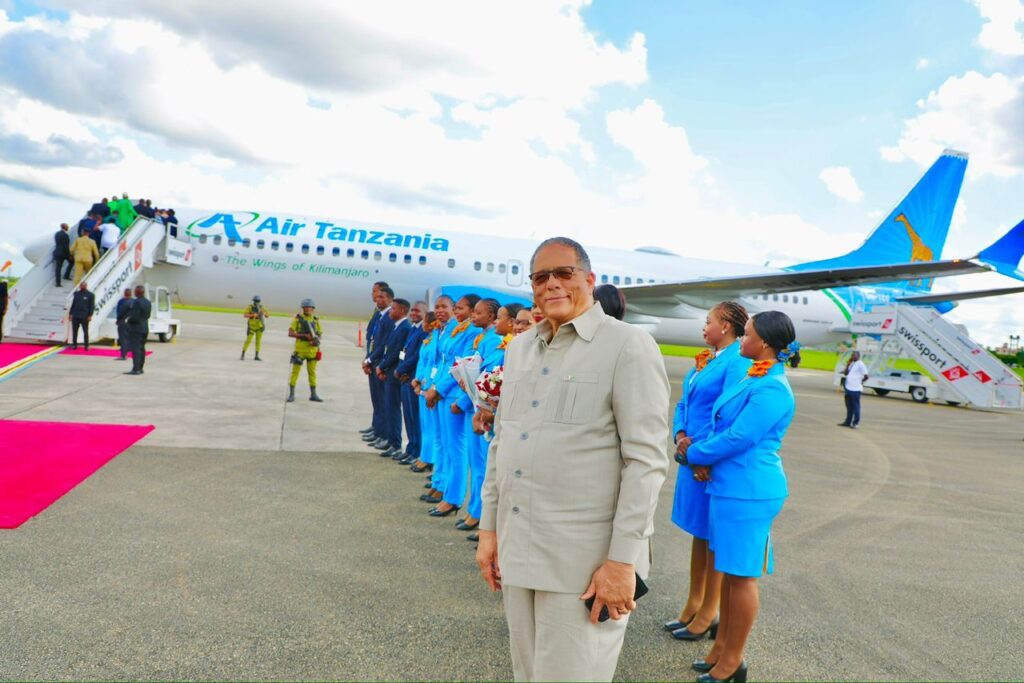- Ban places Air Tanzania among 129 airlines barred from EU skies due to non-compliance with international safety standards.
- The European Union Aviation Safety Agency (EASA) identified safety deficiencies as the basis for the ban.
- These concerns also prevented Air Tanzania from securing a Third Country Operator (TCO) authorization, a critical certification required for non-EU airlines to operate within the zone.
Air Tanzania has suffered a huge setback following its inclusion in the European Union’s Air Safety List, effectively banning it from operating flights to and within EU member states. This decision, announced after a review by EU aviation safety experts in Brussels on November 19-21, signals a major reputational and operational blow to Tanzania’s flag carrier.
The ban places Air Tanzania among 129 airlines barred from EU skies due to non-compliance with international safety standards, as outlined by the International Civil Aviation Organization (ICAO).
Commissioner for Sustainable Transport and Tourism, Apostolos Tzitzikostas, cited the EU’s unwavering commitment to passenger safety, stating, “The decision underscores our dedication to ensuring the highest safety standards in Europe and worldwide. We urge Air Tanzania to address its safety issues swiftly, and the Commission stands ready to assist Tanzanian authorities in achieving compliance.”
Air Tanzania: The Safety Standards in Question
The European Union Aviation Safety Agency (EASA) identified safety deficiencies as the basis for the ban. These concerns also prevented Air Tanzania from securing a Third Country Operator (TCO) authorization, a critical certification required for non-EU airlines to operate within the 27-member European bloc.
The EU’s decision reflects a meticulous evaluation process grounded in ICAO standards. Airlines placed on the Air Safety List often face challenges such as inadequate safety oversight from their respective national aviation authorities or operational lapses that could endanger passengers.
Air Tanzania’s inclusion alongside carriers from countries such as Afghanistan, Sudan, and Zimbabwe points to systemic issues within Tanzania’s aviation oversight framework. This raises questions about the effectiveness of the Tanzania Civil Aviation Authority (TCAA) in meeting global safety benchmarks.
What next on Air Tanzania’s ambitions growth plans
Air Tanzania has been working to establish itself as a key player in the African aviation market, supported by government initiatives and substantial investments in fleet expansion. However, the EU ban threatens to ground these ambitions, particularly the airline’s plans to tap into lucrative international markets.
The airline, which recently acquired state-of-the-art aircraft, including Boeing 787 Dreamliners, had been eyeing new routes to Europe to compete with established African carriers such as Ethiopian Airlines and regional rival, Kenya Airways. With the EU market now inaccessible, Air Tanzania’s growth trajectory faces significant hurdles.
Moreover, the reputational damage from being labeled as unsafe could deter potential partnerships and code-sharing agreements with other international airlines, further isolating the carrier on the global stage.
Broader implications for Tanzania’s aviation sector
The EU’s decision is not just a blow to Air Tanzania but also a wake-up call for Tanzania’s aviation regulatory environment. The ban points to gaps in oversight and safety compliance that could deter foreign investors and stakeholders in the country’s aviation sector.
Tanzania’s government has made strides to position the country as a regional hub for trade and tourism. However, a national airline banned from EU skies sends mixed signals to global travelers and investors alike. The government must now prioritize addressing these safety concerns to restore confidence in its aviation industry.
In response, Tanzanian authorities have indicated their willingness to collaborate with the EU to resolve the identified deficiencies. However, achieving compliance will require robust reforms, enhanced training for aviation personnel, and substantial investments in infrastructure and oversight mechanisms.
EU’s aviation safety agenda
The EU’s Air Safety List currently includes 129 airlines, which have been fingred for potential safety lapses. Alongside Air Tanzania, carriers such as Air Zimbabwe, Fly Baghdad, and Iran Aseman Airlines have also faced similar bans due to serious safety deficiencies.
A small number of airlines, including Iran Air and Air Koryo from North Korea, operate under strict operational restrictions, permitted only with specific aircraft types deemed safe by EU regulators.
The Path to Recovery
For Air Tanzania, the road to recovery will require a comprehensive overhaul of its safety protocols and practices. Key steps include:
- Addressing EASA Concerns: Air Tanzania must work closely with the EU to understand and rectify the safety issues flagged during the review process. This includes enhancing pilot training, maintenance standards, and operational oversight.
- Strengthening Regulatory Oversight: The TCAA must implement reforms to align with ICAO standards and demonstrate its capacity to oversee the airline’s compliance effectively.
- Rebuilding Trust: Transparent communication with stakeholders, including passengers, investors, and international regulators, will be critical in restoring confidence in Air Tanzania’s operations.
- Leveraging International Support: Accepting the EU’s offer of technical assistance could expedite the process of achieving compliance and lifting the ban.
The EU’s ban on Air Tanzania serves as a stark reminder of the critical importance of aviation safety in an interconnected world. While the decision presents significant challenges for the airline, it also offers an opportunity for both Air Tanzania and the Tanzanian government to address systemic issues and align with global standards.
By prioritizing safety reforms and demonstrating a commitment to excellence, Air Tanzania can work towards regaining its place in the EU skies and securing its future as a competitive player in the global aviation industry.
Read also: Air Tanzania launches a second boeing 737-9 Max aircraft











